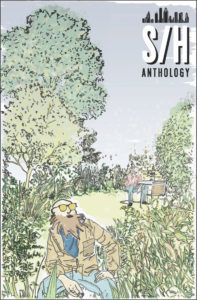Editor’s Note
Some have called fiction writing the oldest profession. In fact, it was our very own Bill Monroe in the inaugural spring 2013 issue. Indeed, writers have always plied their trade wherever the grass is greenest. Shakespeare and Marlowe wrote plays, Chekhov and O’Connor wrote short stories, and, knowing which side their bread was buttered on, Mahfouz and Márquez wrote novels. In today’s digital world, however, markets and publishing outlets abound, and the literary writer has some very dark streets to walk. So, did we imagine that over a span of ten issues Story|Houston would offer a small, bright corner for such aspirants and their pursuits? No, not wittingly, Senator.
Undeniably, the pages of this anthology have brought together strange bedfellows—experienced writers like Nick Flynn tucked in with promising newcomers like Amechi Ngwe. The latter’s “Lunch With Dostoevsky” exhumed Barthelmeic post-modern brio in a gastro-interlude with the Russian literary giant, while Flynn provided an intimate window into family, mortality, and innocence in his electrifying poem “Jelly.” In both instances, we turned to Rice University student Jessica Fuquay to repay these triumphs with illustrations that utilized the warm colors of a Mexican restaurant and the phantasmal imagery of a poet’s scattered imaginations. The authenticity of these contributions could only have been derived from a labor of love.
From our beginnings, we have been fortunate to have Matt Boelsche, the maestro, drawing the indefatigable Driftwood flâneuring through the streets of Houston on every cover. Mr. Boelsche spends his days climbing a hill of his own as an architect and his nights walking the streets with his literary brethren, providing illustrations that sometimes extend onto Story|Houston’s pages. Chief among them has been his illustration of “May Day,” written by one of this city’s greatest writers, Robert Phillips. An author of over thirty books, Phillips chose our first issue to publish the story of a ham delivery man whose recollections of former glories threaded the needle between humor and nostalgia.
And from Rick Moody and Karen Kasaba we were gifted a pair of stories that took us out of the boudoir and into the fringe spaces of the literary world. Back in our summer 2013 issue, Moody was nice enough to set a robust literary career aside for a moment and write “The Turkeys of Marfa,” which reminded us that a famed outpost of Lower Manhattan nightlife is, in fact, a small town in Texas. Another Rice student, Elena Lacey, captured the gobble squabble that divided Marfa’s hipsters, ranchers, and laborers with a portrait of the ugly bird and a flannel-clad admirer. Kasaba’s fall 2014 piece, “Continental Divides,” took us even further West, and even further into the psychological, with a tale of the Esalen Institute overlaid with more grounded familial themes.
Not all the exertion has been expended by those published, however, as behind the lens a largely anonymous volunteer staff has lent their time to faithfully distilling thousands of submissions into selected works. The progression from accepted submission to print has not been mere coronation either, as Mallory Chesser’s editing and grammato-stylistic piety has ensured for our publication the highest quality control. It was with this formidable machinery that we published the Slovenian master Miha Mazzini. His “Snow Angels” began as a grim Balkan tale of a conflict-zone bone collector whose homecoming is disrupted by a mysterious death, the examination of which offered hope in the struggle against solitude and emptiness. Mazzini’s chilling work was balanced by the more humorous contributions we received—notably Tennessean Chris Sumberg’s fast-moving episode about the humiliations of a birthday clown gig. Houston attorney Chelsea Keeton’s teary-eyed clown sketch accompanied the piece. We were also impressed and shocked by Miah Arnold’s “The Mayor’s Cruel Tentacles,” a tale that reminded us of the strangle-hold of public office.
The broader community’s involvement has also proved indispensable. As a non-profit, we are dependent on the financial support of our readership, without whom we would not be able to publish. We are also grateful for the support of our local literary community. Notably, Houston local Lacy Johnson, author of The Other Side and Trespasses: A Memoir, contributed her time as judge for our very first contest, whose finalists are featured in the second half of this anthology. Johnson discovered promising new arrivals Dana Reva De Greff, Victoria Provazza, Adam Blake Wright, and Thomas McConnell, whose ageless “How We Die Now” came out on top.
We hope this journey has been as good for our reading audience as it has been for us. We hope it continues.
Farris Shenaq
Co-founder
Story|Houston

